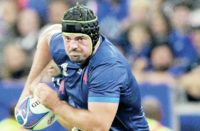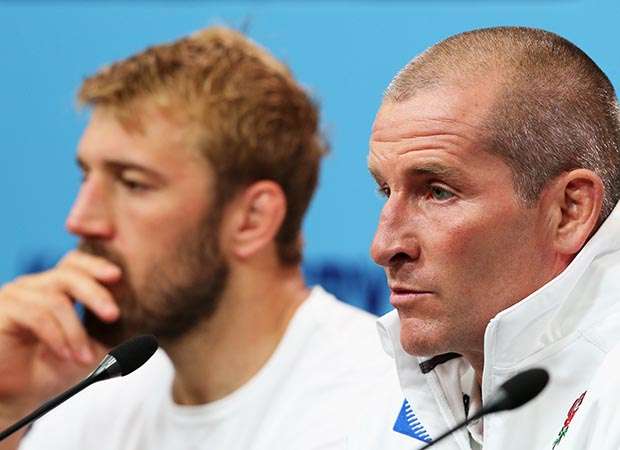 As England limp out of the 2015 World Cup into the annals of great sporting failure as the first host nation in eight tournaments not to make the quarter-finals of this global showpiece, what their journey reflects is a failure of nerve, judgement and conviction.
As England limp out of the 2015 World Cup into the annals of great sporting failure as the first host nation in eight tournaments not to make the quarter-finals of this global showpiece, what their journey reflects is a failure of nerve, judgement and conviction.
That failure has taken root not just in Stuart Lancaster's England camp in terms of coaching and selection, but also in the top tier of the RFU administration that is responsible for senior coaching appointments. The magnitude of the lost opportunity to inspire future generations of English youngsters as their team failed to advance past the pool stage of a World Cup on home turf demands that there is now a root-and-branch clear out of England's elite rugby structure, both playing and administrative.
It may have been a failure by fine margins on the scoreboard against Australia and Wales, but the serial shortcomings of the England coaches and their squad meant that there was always a crash coming round the corner.
During Lancaster's tenure as coach England have invariably fallen short of their goals, becoming ‘nearly men' is in the eyes of their more benign fans, and chokers in the view of those who are less charitable. If an exit in the group stage of the World Cup says it all, the signs before it were not auspicious. Against the Southern Hemisphere big three a mere three wins and a draw, set against 10 defeats, suggested that England were never good enough, and four second place finishes in a less than vintage era in the Six Nations confirmed it.
The stark and unpalatable reality is that England are, minus the binge-drinking, dwarf-tossing and harbour jumping, in a less elevated place as a rugby nation that they were in 2011 when Martin Johnson fell on his managerial sword after the quarter-final defeat by France. Given that some of those at Twickenham who were influential in Johnson's departure are there still, the argument for change is compelling.
Lancaster and his assistant coaches should at least be given the chance to resign in a dignified manner. However, there is no escaping that this is the best-resourced England squad in terms of training time and finance that there has been – and it should be clear to them that not to make the knock-out stage is unacceptable. However, if they are not prepared to shoulder the responsibility then they should be shown the door.
The same should apply to those who appointed this coaching team. Rob Andrew's tenure at the RFU has run its course, and, after ducking responsibility for the 2011 meltdown, it was his championing of Lancaster's credentials that ultimately led to him being appointed as England head coach.
Ian Ritchie, who as RFU chief executive ultimately signed off on not only Lancaster's appointment, but also the the ill-judged contract extension until 2019 handed to him and his coaching team, has said already that he would take the blame if England failed at this tournament.
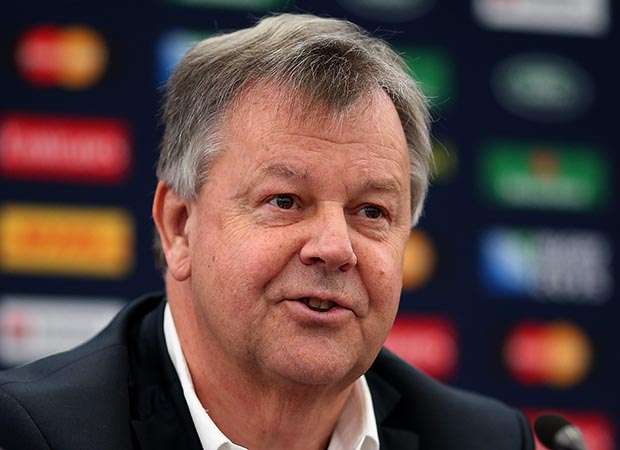 Ritchie's almost inevitable departure is a pity because, despite arriving in the chief executive job without an intricate knowledge of the sport, he has acquitted himself well in every area other than his coaching appointments. Regular readers of The Rugby Paper will know that it was not a decision he made without being aware of dissenting voices, of which mine was among the loudest.
Ritchie's almost inevitable departure is a pity because, despite arriving in the chief executive job without an intricate knowledge of the sport, he has acquitted himself well in every area other than his coaching appointments. Regular readers of The Rugby Paper will know that it was not a decision he made without being aware of dissenting voices, of which mine was among the loudest.
However, he eventually took the advice of Andrew, and others, to back Lancaster rather than pursue decorated non-English coaches like Nick Mallett (South Africa) and Wayne Smith (New Zealand). Or even return to Sir Clive Woodward.
My misgivings at the time were that Lancaster's track-record did not tally with that required of an elite national coach. Being academy manager at Leeds, followed by a couple of seasons as coach of the team that was promoted from the Championship and then relegated from the Premiership the following season does not cut it. Nor does winning three Churchill Cups with the Saxons against limited opposition.
What England desperately needed was a coach who had done the hard yards, whether in the Premiership, Pro 12 or Top 14, and/or at international level overseas with a Tier Two nation, for the best part of a decade – not a relative novice. The rationale was simply than any prospective England coach should have been through his learning curve at club and international level, and come to the job battle-hardened already – preferably with international or elite club silverware to his name.
The idea was definitely not to appoint an inexperienced head coach – and assistant coaches of similar ilk – and pay them a king's ransom to learn on the job. Yet, that is what Ritchie, on Andrew's advice, opted to do.
Alongside Lancaster's limited elite CV, Graham Rowntree's was a little stronger due to a fast-track path, which, after just one season with Leicester, saw him appointed as England forwards coach under Johnson in 2008, and as a Lions assistant coach in 2009. Andy Farrell's credentials were three seasons as a skills and defence coach at Saracens, and Mike Catt's four seasons as London Irish backs/attack coach.
Their collective lack of coaching experience has proved costly, not only during this World Cup campaign but in the three and a half years preceding it. For example, it is not Lancaster's fault that he had never been to South Africa on rugby duty before the 2012 tour. However, to hear that an England rugby coach had no prior knowledge of one of the biggest international powers on the planet is disconcerting.
The naiveté was also reflected in the head coach's first visit to the Millennium Stadium, for the 2013 Grand Slam showdown. Little wonder that, never having been on the ground before, Lancaster and his team were taken aback by the sonic boom of the crowd noise when the roof was closed.
The unworldliness in the England camp was emphasised by the failure of anyone associated with it to recall that the 1990s England team had defused the Cardiff crowd factor by playing Land of my Fathers at full volume on a Tannoy system throughout their training sessions at Kingsholm in 1991. That England team were so sick of the Welsh anthem that by the time they had run out in Cardiff it was a non-factor, and they powered through Wales to win 25-6 on their way to a Grand Slam.
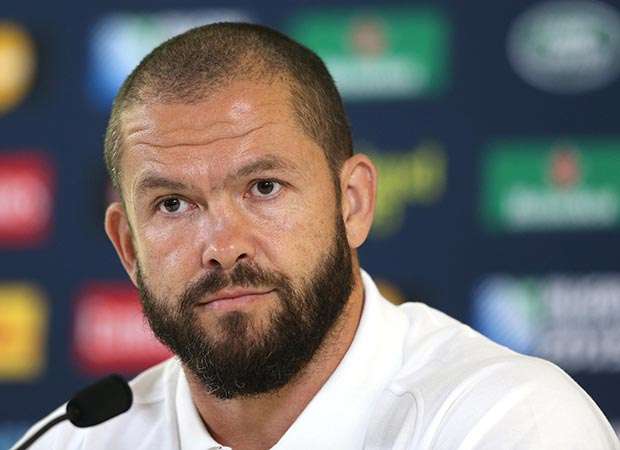 By contrast, Lancaster's shell-shocked 2013 side were overwhelmed 30-3, having failed to absorb the lessons of English rugby history despite their head coach's avowed intent to connect his team to their Red Rose forebears. The fact that Geoff Parling was unaware of who Peter Winterbottom was when the great England openside – who played in the 1991 and 1992 Grand Slams – was presenting shirts to the team before a recent international, suggests in any case that the process is as much spin as substance.
By contrast, Lancaster's shell-shocked 2013 side were overwhelmed 30-3, having failed to absorb the lessons of English rugby history despite their head coach's avowed intent to connect his team to their Red Rose forebears. The fact that Geoff Parling was unaware of who Peter Winterbottom was when the great England openside – who played in the 1991 and 1992 Grand Slams – was presenting shirts to the team before a recent international, suggests in any case that the process is as much spin as substance.
There were other instances of coaches and players fluffing their lines badly in the Six Nations. Among the most notable were falling foul of the Ireland aerial attack last season in Dublin through inadequate high-ball preparation, and the previous season Lancaster making unforced bench changes late on in Paris which opened the door to a French surge.
There were shades of the same error being repeated with the final quarter replacements against Wales at Twickenham last weekend. In fact, serious lapses in tactical awareness and preparation have become a recurrent theme. From Billy Vunipola not knowing about the importance of the bonus point try against Fiji, to the reluctance of Farrell to go for the touchline kick to draw level against Wales, to the call to Robshaw at the front of the line-out, it all smacks of too many indians and not enough chiefs.
It's up to the captain to make the big decisions, and with a draw there for the taking with only three minutes left – and the chance to get the ball back even if it missed – it shouldn't have needed a conference call. England's driving line-out is not even average, and Robshaw and Lancaster should have rehearsed the scenario umpteen times and ruled it out. All the skipper needed to do was flip the ball to Farrell with a word of encouragement, and then tell all but the sweepers to chase like hell.
While no one can fault Lancaster's good intentions, or his decency, the relentless message about team culture and the privilege of playing for England frequently appears to have become overblown, and confused. This was typified by the crass decision to put the Victoria Cross motif on the shirt.
Players with too much of an individual streak in their DNA – with Danny Cipriani and Dave Attwood the most obvious examples – appear to have labelled as ‘suspect' too readily by Lancaster and his coaches, and given limited opportunity to prove themselves. Meanwhile, stolid ‘Steady Eddies' were allowed to become so deeply embedded in the squad that it obstructed the main aim of any international coach, which is to win Test matches and trophies.
Which brings us to Steffon Armitage. Having refused to invoke the RFU's ‘exceptional circumstances' clause which would have allowed him to bring Armitage back into the fold for the summer training camp, Lancaster finally gave his total backing to Chris Robshaw as his captain and first-choice openside. This, despite Armitage's form for Toulon in a hat-trick of European Cup-winning campaigns, and also in the Top 14, establishing him as one of the most effective No.7s in the Northern Hemisphere.
However, instead of returning Robshaw to his best position at blindside – where Dean Richards played him during his breakthrough years at Harlequins – Lancaster continuously endorsed his credentials at 7. This left England without a true breakdown turn-over specialist in a World Cup in which, predictably, it has been a highly influential area already.
Yet, in 2013, when Robshaw was not only overlooked by the Lions but put on gardening leave during England's summer tour of Argentina, Lancaster came back from South America singing the praises of Matt Kvesic. His belief in Kvesic's abilities did not last into the following season, with the openside, who had joined Gloucester from Worcester, going off the boil in his first season at Kingsholm. At no stage in the Six Nations was Kvesic called into the England 23 as a reminder of Lancaster's conviction in his ability.
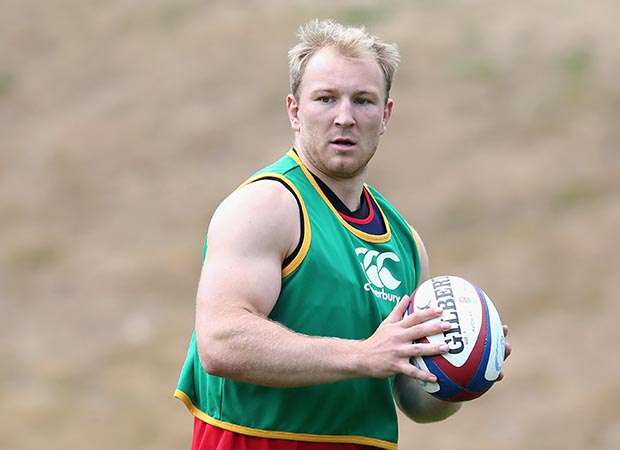 This lack of conviction in selection is a recurrent theme with the head coach. He has had a tendency to flip-flop throughout his tenure, rather than back to the hilt the players he thinks can make a difference. Nowhere is this more starkly illustrated than at centre, where Lancaster has selected 14 different combinations – with the pairing of Sam Burgess and Brad Barritt against Wales the most recent of them.
This lack of conviction in selection is a recurrent theme with the head coach. He has had a tendency to flip-flop throughout his tenure, rather than back to the hilt the players he thinks can make a difference. Nowhere is this more starkly illustrated than at centre, where Lancaster has selected 14 different combinations – with the pairing of Sam Burgess and Brad Barritt against Wales the most recent of them.
This involved Barritt, whose best position by far is inside-centre, being pressed into action at outside-centre again – repeating the experiment which kept Jonathan Joseph out of the England side in the last Autumn series. In fact, despite outstanding form, the Bath centre did not win a place in the side until the Six Nations.
By that time George Ford had supplanted a struggling, and then injured, Owen Farrell at fly-half, and when his Bath backline colleagues Joseph and Anthony Watson were bought in for the Six Nations opener against Wales in Cardiff, England were galvanised. When tries by Joseph and Watson saw England to victory it was clear that, despite the absence through injury of Farrell, Barritt and the powerful Manu Tuilagi, there was more than one string to Lancaster's bow.
Despite the nose-dive in Dublin, Ford's play-making and Joseph's strike running were instrumental in England finishing the tournament as top try scorers with 18. Furthermore, although they again came second to Ireland on points difference, a new attacking template had been bedded-in before the World Cup.
What has happened between the end of March and England's World Cup exit at Twickenham last night is that template being abandoned because of a loss of nerve. It saw Lancaster and company revert against Wales to a percentage mentality of playing to stop the other side winning, through pressure and kicking penalties, rather than England going out to win it through their own attacking ability.
By picking Farrell – who hadn't started for 10 months – alongside Union novice Burgess and the out-of-position Barritt, purely because Joseph was injured, demonstrated a complete loss of faith in England's ability to outplay Wales as they did last February. Rather than go to a talented footballer like Henry Slade as a direct replacement for Joseph – not forgetting that Slade outshone Burgess when they played together in the warm-up against France – Lancaster axed Ford in favour of a relatively slow midfield designed to bash-and bang Wales into submission.
It was a policy that backfired in the final stages of a match in which England were neither the fittest team on the planet nor the best prepared.
Against Australia the percentage mentality was still to the fore, because, although a patched-up Joseph was back, Ford, the play-maker on whose prompts he thrives, was on the bench.
In the end, Lancaster's England have not had the conviction, nerve or judgement that was needed to escape the Pool of Death, and the road they travelled has taken them from being the nearly men of the Six Nations to the nowhere men of their own World Cup.


